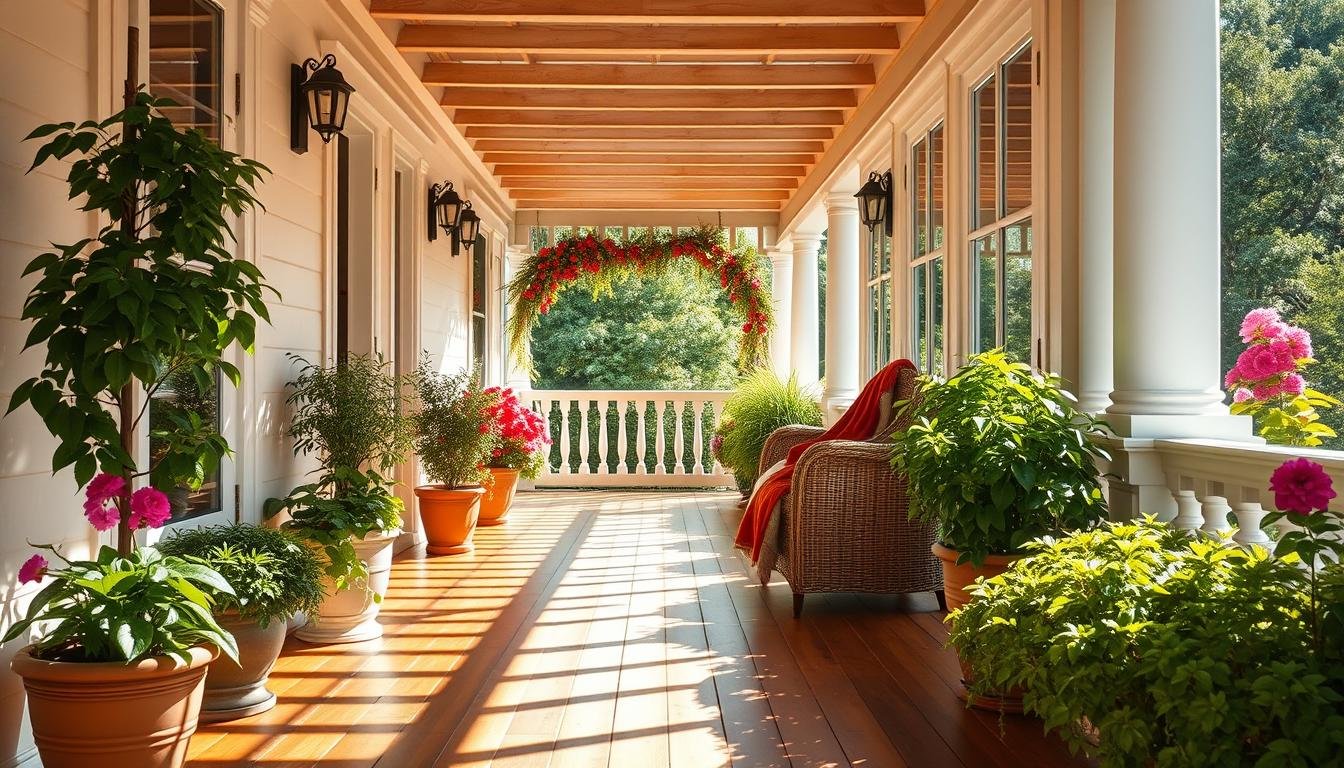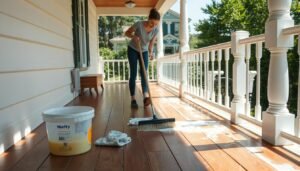Imagine a peaceful afternoon on your porch without wasps bothering you. You can create a wasp-free porch using some smart tips. We’ll share wasp prevention tips to make your outdoor space enjoyable again. To keep wasps away, clean up food spills, secure trash, and remove standing water.
Wasps love food, especially sweets. This makes outdoor areas more attractive to them. Cleaning up food spills is crucial to avoid attracting wasps. Make sure your trash cans are closed tightly to keep wasps out. This shows how important it is to manage waste to keep wasps away.
Checking around windows, doors, and utility lines helps stop wasps from coming in. Putting up fine-mesh screens can keep wasps out but let fresh air in. Make sure the mesh is fine enough. It’s also good to regularly check for and remove standing water in your yard. This helps reduce attractive spots for wasps, making your porch less likely to host them.
Key Takeaways
- Effective cleaning of food spills deters wasp attraction.
- Sealing garbage cans tightly prevents wasps from swarming.
- Inspecting and closing gaps around windows and doors reduces wasp entry points.
- Installing fine-mesh screens can block wasps while allowing air circulation.
- Reducing sources of standing water can decrease the likelihood of wasps on your porch.
Understanding Wasps and Their Behavior
To manage wasps well, it’s key to grasp their habits and what attracts them to your area. They are drawn by food, water, and nesting places. These give them what they need to live well.
Knowing why wasps come near humans is important. They look for protein and sweets, mostly when it’s warm. By late summer, yellow jackets get more aggressive as they prepare for winter.
Learning cool facts helps understand wasps better. They like bright colors and could bump into us more. Unlike others, mud daubers don’t often sting people, making them less scary.
Some wasps can recognize each other, which is cool. This skill helps them work together. They build nests from chewed wood, not wax like bees do.
Knowing these things helps in dealing with wasps. Check your place in spring to avoid nests. If wasps keep coming back, getting help from pros is a smart move.
Preventive Measures to Keep Wasps Away
Understanding effective wasp prevention strategies is crucial to enjoy a wasp-free porch.
One simple wasp prevention strategy is using ultrasonic pest repellers. These can keep wasps away without harmful chemicals. Use multiple units for larger decks.
Another key step is managing food sources. Wasps like sugary stuff. Clean up spills quickly to keep them away. Also, keep trash cans with tight lids away from decks.
To wasp-proof your porch, seal openings like gaps around windows and doors. A tightly sealed trash can cut wasp attraction by half. This greatly lowers the risk of an invasion.
Switching outdoor lights to yellow or sodium vapor types can cut wasp attraction by about 30%. Also, planting mint and eucalyptus around patios can deter wasps with their scents.
Peppermint oil can also repel wasps. It is eco-friendly and can reduce sightings by 70%. Regular cleaning and checking for nests keep wasps away.
Here is a detailed table of these pest prevention measures:
| Strategy | Effectiveness |
|---|---|
| Ultrasonic Pest Repellers | Great for open areas; may need multiple units for large decks |
| Sealing Entry Points | Prevents entry and nesting |
| Yellow or Sodium Vapor Light Bulbs | Reduces wasp attraction by ~30% |
| Peppermint Oil | Up to 70% reduction in sightings |
| Properly Sealed Trash Cans | Reduces attraction by 50% |
| Planting Mint and Eucalyptus | Deters wasps effectively |
Using these wasp prevention strategies and proper pest prevention techniques, you can easily enjoy a wasp-free porch and outdoor area.
Natural Repellents for Wasp Control
Understanding how to use natural wasp repellents makes your outdoor areas safer and more comfortable. Use essential oils like peppermint, eucalyptus, and clove oil for a natural fix. Mix a few drops with water in a spray bottle. Then, spray it around spots where wasps hang out, like your porch.
Planting certain plants also keeps wasps away. Try mint, basil, thyme, and lemongrass in your garden. These plants release scents that wasps don’t like. Adding these to your garden helps keep wasps at bay as part of organic pest control.
Another tip is mixing 2 tablespoons of liquid dish soap with water. This mix can be sprayed directly on wasps. It messes with their protective coating, driving them away. Keeping your area clean of food and waste helps too. Always clean up food right away and keep trash cans sealed.
For more tips on keeping wasps away with natural methods, check out this detailed resource. Remember, wasps are busiest in July. And evenings are the best time to tackle a wasp nest, as they’re less active then.
To really keep wasps away, use several methods together. Combine repellent plants, essential oils, and homemade mixes for a strong defense. These eco-friendly strategies let you enjoy the outdoors without wasp troubles.
Creating a Wasp-Unfriendly Environment
To fight wasps effectively, making your space less welcoming to them is key. Installing fine-mesh screens on doors and windows helps a lot. These screens block wasps but keep air flowing in.
Using fake wasp nests also works well. Wasps won’t come near if they think another nest is close by. Also, choose decorations carefully to avoid attracting wasps. Steer clear from bright colors and untreated woods that they like.
Keeping up with maintenance is super important. Always check and fix any damage to your screens. A tiny gap is all a wasp needs. Clean your gutters in spring and fall to avoid wasp nests there. Clean up right after eating outside too. Wasps love protein and sweet things like fruit on the ground.
The table below shows key ways to keep wasps away and maintain a clean space:
| Wasp Deterrent | Implementation Tips |
|---|---|
| Fine-Mesh Screens | Install on windows and doors to limit wasp entry |
| Fake Wasp Nests | Hang in areas you want to protect; wasps are territorial |
| Gutter Cleaning | Clean at least twice a year to remove potential nesting sites |
| Outdoor Cleanliness | Remove food scraps and clean spills to avoid attracting wasps |
| Surface Maintenance | Paint or varnish surfaces to prevent nest attachment |
By making these strategic updates and keeping things tidy, you can make your space unwelcoming to wasps. This greatly cuts down the chances of an infestation.
Safe Ways to Remove Wasp Nests
It’s key to remove wasp nests to stay safe and keep peace. With 4,000 wasp types in the U.S., it’s crucial to know how to safe nest removal. Here are tips for effectively dealing with wasp nests.
First, make sure you stay safe. Wear protective clothing and use tools that keep you far away. Using a wasp spray like Hot Shot that reaches 27 feet is a good idea. Remove nests early in the morning. That’s when wasps are less active.
For big nests or nests that are hard to reach, get help from pros. Companies like Spring Green have the right tools and know-how for safe nest removal.
If you want to do it yourself, start by knowing your wasp and how big the nest is. For example, a European hornet nest holds 200 to 400 workers. It’s often over six feet off the ground. Using traps can also help. You can buy them or make them yourself. They lower wasp numbers before and during removal.
What to Do if You Get Stung
If you get stung by a wasp, act quickly. Quick action can lessen pain and prevent further problems. Clean the sting spot with soap and water to take out venom. Because wasps can sting more than once, it’s crucial to treat their stings right away.
Put a cold pack or ice in a cloth on the sting for 10 minutes. This action helps reduce swelling and ease the pain. Using antihistamines and hydrocortisone creams can also help. They lessen itching and swelling, making them important for first aid.
Watch out for signs of an allergic reaction. These signs include trouble breathing, swelling of the face or throat, hives, feeling sick, and getting dizzy. If you notice these, get medical help immediately because anaphylaxis is very serious. People who know they are allergic should always have an EpiPen.
There are home remedies that can provide relief too. Making a paste from baking soda and water or applying apple cider vinegar can counteract the venom. Essential oils like lavender and tea tree oil can also soothe the sting when applied directly.
Understanding how to deal with wasp stings helps you be ready to respond fast and effectively. Remember, while you can manage most stings at home, severe reactions need immediate medical attention. Stay knowledgeable and safe!
Other Helpful Resources
This section offers helpful resources to improve your understanding and success in wasp control. It lists various sources, including experts and educational content, to help you keep wasps away all year.
Think about contacting professional pest control firms like Lindsey Pest Services. They have over 23,000 customers and a top 5-star rating on Google. They promise same-day service for quick and efficient pest management. This can be key if your own efforts don’t work out.
There’s also a wealth of info online. Websites focused on pest control provide helpful guides. Community forums are great to get advice and share what works with other homeowners. Topics range from natural repellents to DIY traps.
Making routine checks on your property can keep wasps at bay. Fixing screens and cutting off food sources are good steps. Using these tips and resources can expand your knowledge and help keep your area wasp-free.




